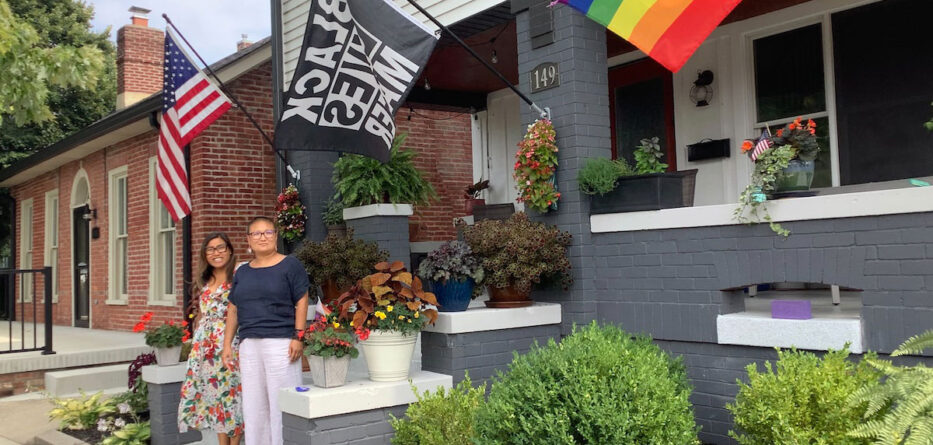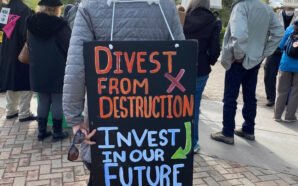Rong Xiaoqing
Ethnic Media Services
Anne Watkins says the January 11 stabbing of an 18-year-old Chinese American student by Billie Davis, 56, who is white, fundamentally changed her perception of the city she calls home.
“When it happened in Bloomington, I was like, they’re one step closer,” says Watkins, a Taiwanese American and recent graduate of nearby Indiana University. Watkins currently works as an assistant manager at a Starbucks on the university campus in Bloomington.
But for Indiana-born Chinese American and IU alumna Katherin Chi, the attack came as no surprise. An active member of the Indiana chapter of the National Asian Pacific American Women’s Forum (NAPAWF), Chi had witnessed the rise in anti-Asian hate nationwide and warned Bloomington officials and residents of the impending danger.
“This was our biggest fear,” says Chi, recalling the unprovoked attack at a local bus stop.
Davis allegedly told investigators that she stabbed the female victim because she was Chinese, saying “it would be one less person to blow up our country,” according to the police affidavit. The victim survived the attack. Her family has asked that she remain unidentified out of fears for her safety.
A federal grand jury decided in April to charge Davis with one count of a hate crime. The victim and her family have not spoken publicly about the incident, and they declined interview requests for this article. Davis’s son, meanwhile, told local media that his mother is mentally ill.
The ensuing silence surrounding the case troubled Watkins. “I felt like it was a hot topic in Bloomington for two or three days, and after that it just vanished.”
Yet for members of Indiana’s growing API community, there remains a lingering anxiety and fear. For some, the attack came as a wakeup call long in the making.
‘That could have been me’
“I thought I was white before I was 30,” says Michelle Waugh-Dahl, a Korean adoptee who grew up in Franklin, an hour north of Bloomington. It wasn’t until 2016 and the election of Donald Trump that Waugh-Dahl began to have misgivings about her own identity, and about broader issues of race and equity.
She began distributing food outside her home, later joining in Black Lives Matter protests and painting slogans in support of the movement across her front yard. Friends were confused, some began to shun her. But for Waugh-Dahl, the attack brought home a troubling lesson: “That could have been me on the bus.”
Indiana’s API community has almost doubled in size since 2010 to more than 191,000, making up 2.8% of the state’s overall population. And while there are around 150 API-serving organizations across the state, according to a study from Asian American Alliance Inc., which focuses on empowering Asian American business and civic leadership, most have focused largely on cultural promotion and social services. Then came NAPAWF Indiana.
Founded in 2020, the group advocates on behalf of API women and is a fierce promoter of social justice issues. It’s arrival in Bloomington could not have come at a more critical moment, as attacks targeting Asian Americans that same year spiked by as much as 145% in cities across the country, according to data from the Center for the Study of Hate & Extremism at California State University, San Bernardino.
While data on Indiana does not identify a specific race or ethnicity, the U.S. Department of Justice found 87 incidents of “race, ethnicity or ancestry” motivated attacks in 2021, double the number from two years prior.
Asian Americans in the state, meanwhile, say the atmosphere has become notably more hostile, citing a rash of incidents, including the 2021 mass shooting that killed eight people, including four Sikh employees at an Indianapolis FedEx facility where the majority of employees are Sikh. This year, Purdue University Northwest Chancellor Thomas Keon was captured in a recording mocking Asian languages during a commencement address.
Even in more liberal Bloomington, API residents say they’ve seen a growing number of vehicles flying the Confederate flag, while a standoff in 2019 between activist groups and white nationalists at an area farmers market grabbed national headlines.
For NAPAWF Co-chair Melissa Borja, by the time of the stabbing in January, “we were already exhausted, it’s not sustainable to continually react. We have to make connections with other AAPI people in Indiana before an event happen.”
But Borja and other NAPAWF members note that it’s not even clear where the Asian Americans are in Indiana. ”We need to proactively make spaces to network, organize and build solidarity.”
Past as predicate
That sense of solidarity was evident during a rally in Indiana following a 2021 shooting spree that killed seven women, six of them Asian American, in Atlanta. Rupal Thanawala, president of the advocacy group Asian American Alliance, says she expected maybe two dozen people to show up that day. Instead, more than 200 came, making it the largest such protest by Asian American residents in the state.
“Chinese organizations, Korean organizations, Indian organizations, Burmese organizations, we all came together,” recalls Thanawala.
In the same month, NAPAWF Indiana delivered a petition signed by more than 2,700 individuals and 49 local organizations to Republican Governor Eric Holcomb asking him to address anti-Asian violence.
Kwan Hui came to Indiana 34 years ago. Today he serves as president of the Indiana Association of Chinese Americans, which he says has since its inception in 1973 focused primarily on cultural promotion. But, he adds, “society is changing… we have added racial discrimination to our watch list.”
A retired researcher for the drugmaker Eli Lilly, Hui says until recently API organizations in Indiana kept mostly to themselves. That has now begun to change in response to the rise in anti-Asian hate, which Hui says has prompted groups to work together.
“The person who stabbed the IU student, she didn’t care whether you were actually Chinese or not. This is against all Asians.”
An uphill battle
In a state where 84% of residents are white, making the case for tighter protections for API and other minority groups can be daunting.
While Indiana’s Democratic Party has an African American Caucus and a Latino Caucus, no such caucus exists for the API community. Neither is there a legislative commission on API affairs similar to commissions on Black, Latino and Native American issues.
In its most recent petition sent to Gov. Holcomb earlier this year, NAPAWF urged the state to establish a statewide advisory committee on AAPI Affairs. So far, no response has been forthcoming. (The Governor’s office did not reply to inquiries from this reporter.)
Legal tools to fight discrimination, meanwhile, are often non-existent.
Until recently, Indiana was among a small number of states without a hate crime law on the books. That changed in 2019, when Indiana finally passed a bill creating for the first time hate crime legislation in the state.
But critics say the language of the bill around protection of specific groups is so vague as to render it almost meaningless. An analysis by the Brennan Center for Justice in 2020 still listed Indiana as one of five states without a hate crime law because of its “failure to list protected classes.”
Coming forward to confront hate
For many in the API community, coming forward to file a complaint may not be an option, says Randy Diaz, the immigrant outreach specialist at the Indianapolis Metropolitan Police Department. Immigrants “may not feel comfortable to talk to a police officer,” Diaz explains, citing immigration status and language barriers as among the reasons for this reticence.
Diaz says the absence of hate crime legislation in the state leaves his hands tied. “When you commit a crime against someone based on hate… because we don’t have (a hate crime code), it’s hard to report it,” said Diaz. “I cannot arrest you for something that doesn’t exist.”
Others say the solution lies at the ballot box and in greater political participation by API communities. “How many (Asians) want to run for office?” asked Thanawala of the Asian American Alliance. “I want people from my community to be part of the system.”
In 2020, NAPAWF Indiana launched a voter mobilization campaign in multiple Asian languages. The organization plans to replicate the operation in future elections.
In May, Shruti Rana, assistant dean and professor of international law & human rights at Indiana University Bloomington and a co-founder of NAPAWF Indiana won a primary to become the Democratic candidate for the city council, a position she is likely to win given there is no Republican candidate in her district.
“We don’t have the option of turning around and pretending discrimination doesn’t exist, or that racial prejudice doesn’t exist, or that gender discrimination doesn’t exist,” said Rana. “These are issues we care about and are going to address.”
At the Asian Cultural Center on the IU campus in Bloomington, director Melanie Castillo-Cullather is preparing for the new term on a scorching day early August. Under her leadership, her center became the command center for the Bloomington Asian American community to address their fears after the stabbing. She knows the trauma from the stabbing will still be with the students as they return for the fall semester. While she isn’t able to offer updates on the case or the victim, she can offer something else.
“Let’s give her and the family some space and time,” says Castillo-Cullather, who is also a founding member of NAPAWF. “When the survivor is ready, she knows we are here and that we have her back. There is an Asian American community here.”
This story was produced in partnership with The Vincent Chin Institute as part of a series looking at the long-term impacts of hate on communities in California and nationwide. The original Chinese appeared in the pages of the Sing Tao Daily New York.






